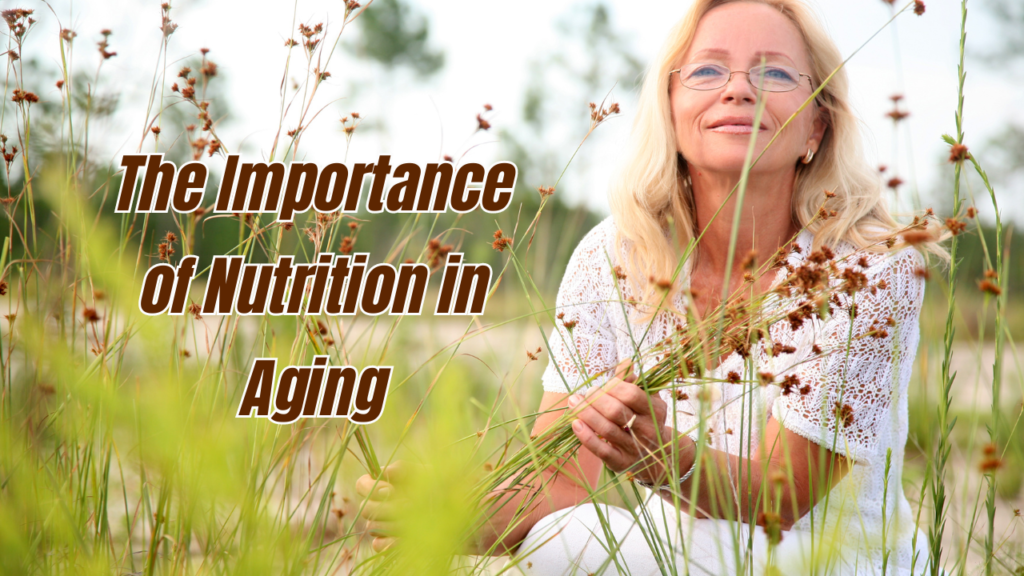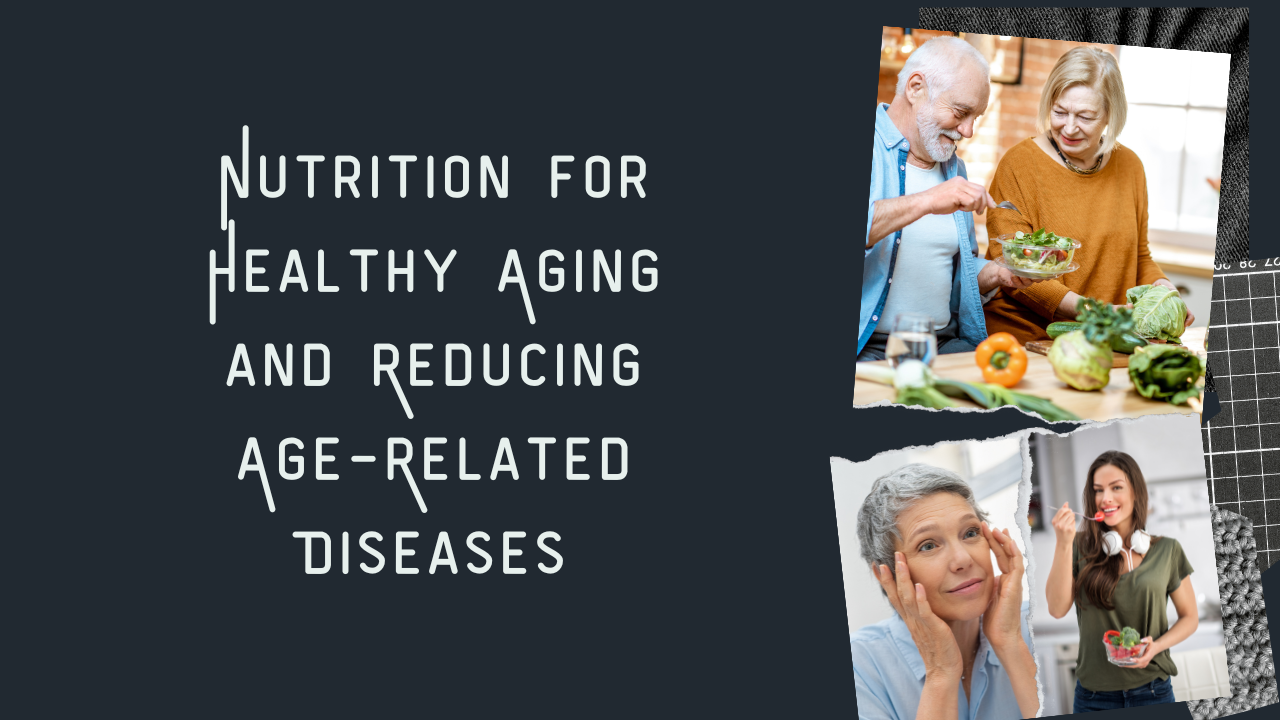As we age, our bodies undergo many changes that affect our health and well-being. Nutrition plays a crucial role in our aging and could significantly impact our ability to prevent and fight age-related ailments. If we make the right choices regarding our diet, we can improve our quality of life, slow the aging process, and lower the chance of developing chronic diseases. This article will explore the vital nutrition and diet strategies that promote healthy aging and safeguard against the effects of age.
The Importance of Nutrition in Aging

Diet is crucial to aging well. As we age, our bodies require specific nutrients to ensure our health, maintain vitality, and improve cognitive performance. Inadequate nutrition can speed up the process of aging and raise the chance of developing conditions like heart disease, osteoporosis, diabetes, and cognitive decline.
The reason why nutritional needs change with age
- Metabolic Slowdown: As metabolism decreases, the body can use fewer calories but still require adequate nutrition.
- Nutrient Absorption Aging can impact digestion, making it difficult for the human body to absorb certain vitamins, such as calcium, vitamin B12, and iron.
- Muscle Mass Decline: As we age, a decrease in muscle mass, commonly referred to as sarcopenia, may occur, requiring a higher protein intake to maintain muscle strength.
Common Age-Related Health Concerns
- Cardiovascular Disease: The risk of suffering from heart disease increases as you age one is due to factors such as high blood pressure and cholesterol.
- Osteoporosis The bones that age can become brittle and weak, increasing the chance of breaking.
- Cognitive decline: The mental and memory function can decline over time, leading to diseases such as dementia.
- Diabetes: In general, insulin sensitivity decreases with age, increasing the risk of developing type 2 diabetes.
Critical Nutrients for Healthy Aging
Focusing on a diet high in specific nutrients is crucial to promoting healthy aging and reducing the chance of developing age-related illnesses. These nutrients are essential in sustaining the body’s functions and preventing chronic diseases.
Protein: Preserving Muscle Mass
Protein is vital for maintaining muscle mass, which tends to decrease with age. A healthy protein intake can help fight sarcopenia and increase strength and general mobility.
- The sources are Lean meats, eggs, fish, poultry dairy products, legumes, nuts, and seeds.
- Recommended intake: Older adults should aim for 1.0 or 1.2 grams of protein for every kilogram of body weight per day.
Calcium and Vitamin D: Supporting Bone Health
Vitamin D and calcium are vital for maintaining strong bones and preventing osteoporosis. Vitamin D is also involved in the immune system and reduces inflammation.
- Quelles for Calcium Dairy-based products, supplemented plants-based milk, leafy vegetables, and tofu.
- The sources of Vitamin D are fatty fish, fortified foods, and exposure to sunlight.
- Recommended intake: Older adults should aim for 1,000-1200 milligrams of calcium and 800-1000 IU of vitamin D each day.
Omega-3 Fatty Acids: Protecting Heart and Brain Health
Omega-3 fatty acids (especially EPA and DHA are well-known as anti-inflammatory. They are essential for brain and heart health. They could benefit lower the risk of developing heart diseases and decline in cognitive function.
- Sources: Fatty fish (salmon mackerel, sardines, mackerel), flaxseed seeds, walnuts, and flaxseeds.
- Recommended intake: Aim for two servings of fatty fish per week or the omega-3 supplement.
Antioxidants: Combating Oxidative Stress
Antioxidants benefit from neutralizing the effects of free radicals, which can cause cell damage, aging, and age-related ailments. Vitamin C, E, selenium, and zinc are potent antioxidants.
- Sources of Vitamin C are citrus fruits, bell peppers, berries, and broccoli.
- Sources of Vitamin E: Nuts seeds, spinach, and avocados.
- Recommended intake: A diet rich in vegetables, fruits, and whole-grain foods will focus on providing enough antioxidants.
Fiber: Supporting Digestive Health
Fiber is essential for maintaining digestive health and preventing constipation, which may be more prevalent with age. It also aids in regulating blood sugar levels and is beneficial for heart health.
- The sources are Whole grains, legumes, fruits, vegetables, and nuts.
- Recommended intake: Aim for 25-30 grams of fiber a day.
Dietary Strategies for Healthy Aging
Alongside paying attention to specific nutrition, following certain diet routines can promote healthy aging and lower the risk of developing chronic diseases.
The Mediterranean Diet
The Mediterranean diet is believed to be among the diets that have been studied extensively to promote longevity and reduce the risk of developing age-related illnesses. It emphasizes whole foods, healthy fats, and plant-based diets.
- Essential Components: Olive oil, vegetables, fruits, whole grains and legumes, nuts, and moderate consumption of poultry and fish.
- Advantages The diet has been proven to lower one’s risk for heart disease, decline in cognitive function, and some cancers.
Plant-Based Eating

A plant-based diet is based on food that comes from plants and is high in nutrients that aid in healthy ageing. It may lower the risk of developing chronic diseases through reducing inflammation and helping to maintain an ideal weight.
- Essential Components: Fruits, vegetables, whole grains, beans, nuts, seeds, and a few animal products.
- The benefits: Diets based on plants reduce the risk of diabetes, heart disease, and some cancers.
Caloric Restriction
Numerous studies have associated longer life spans with calorie restriction, not malnutrition. This means limiting calories and ensuring proper nutrition.
- Methodology: mindfulness of nutrient-dense food items and avoid empty calories in sugary, processed food items.
- Advantages Caloric limitation can increase the health of your metabolism, decrease inflammation, and protect against age-related ailments.
Lifestyle Factors Complementing Nutrition
While nutrition is the cornerstone of healthy aging, other aspects of life play an important part in promoting overall health and decreasing the chance of developing age-related illnesses.
Regular Physical Activity
Exercise is crucial for maintaining bone density, muscle mass, and cardiovascular health. It also aids in improving mental health and cognitive performance.
- Different types of exercise: Include a mix of aerobic exercise (walking or swimming), strength training, and stretching exercises (yoga, stretching, yoga).
- frequency: Aim for a minimum of 150 minutes of moderate-intensity exercise each week.
Hydration
Hydration is often neglected, but it is essential for maintaining well-functioning skin, digestion, and cognitive performance. As we age, the feeling of thirst can decrease, which is why it’s vital to drink plenty of water all day long.
- Water Tips for Hydration: Drink water during meals, carry an empty water bottle, and eat foods that hydrate you, such as fruits or vegetables.
Sleep
Sleeping well is essential for healthy aging. It helps improve brain function, emotional well-being, and physical well-being. Lack of sleep can raise the chance of developing conditions such as obesity, heart disease, and cognitive decline.
- SLEEP TIPS: Establish a regular sleep schedule, create a comfortable sleeping environment, and avoid stimulants such as caffeine before bed.
Stress Management
Stress can speed up aging and lead to the advancement of age-related ailments. Techniques for managing anxiety, such as meditation, mindfulness, and exercise routines, are crucial to overall well-being.
- Tips for reducing stress: Practice mindfulness meditation, engage regularly in physical exercise, and maintain your social networks.
Practical Tips for Implementing a Healthy Aging Diet

Changes in your diet may seem overwhelming, but taking small, incremental steps can result in long-lasting outcomes. Here are some helpful guidelines to help you start implementing a diet that promotes healthy old age.
Begin with minor changes.
Start by adding more fruits and vegetables, as well as whole grains, to your diet. Switch out processed foods for healthy alternatives, and gradually increase the amount of nutritious food items.
Approach Balanced Meals
Make sure every meal has an appropriate amount of proteins, healthy fats, and complex carbs. This will stabilize the blood sugar level and provide an energy source that lasts a long time.
Listen to Your Body
Be aware of how various food items affect your mood. Certain people might have food sensitivities that become evident with time. Change your diet to reduce discomfort and ensure more efficient digestion.
Stay Informed
The field of nutrition science is always developing, so keep yourself informed of the most recent research findings on healthy aging. A consultation an experienced registered dietitian nutritionist could impart specific advice.
Conclusion
Age-related health is possible by combining good food choices, regular physical exercise, and a mindful approach to lifestyle choices. If you focus on an eating plan that is rich in vital nutrients, follow healthy dietary practices such as that of the Mediterranean as well as a plant-based diet, and make educated decisions about your lifestyle, you can lessen the risk of developing health-related maladies and lead an active, satisfying life even as you get older.
It’s not too late to start taking positive steps. Simple, consistent efforts can result in significant improvements to your overall health and well-being over time. Accept the process of aging knowing that you are able to improve your health and enjoy your golden years with energy and happiness.
FAQs
What are the perfect and most essential vitamins for healthy aging?
The most important nutrients for maintaining healthy aging include protein for maintaining muscle health and calcium, vitamin D to support bone health, omega-3 fatty acids to support brain and heart health, antioxidants to fight the effects of oxidative stress, and fiber to support digestion.
What can I do to lower the risk of developing age-related illnesses through my diet?
Reduce the risk of getting older-related diseases by eating a balanced and healthy diet that is high in vegetables, fruits and whole grains, as well as protein lean, as well as healthy fats. Insisting on eating foods with high levels of nutrients like those that are found in Mediterranean as well as plant-based diets reduces the chances of developing heart disease and osteoporosis. And cognitive decline.
Does it make sense to supplement my diet as I get older?
Although a balanced diet can provide all the nutrients you require, some seniors might require supplements, especially for calcium, vitamin D, and vitamin B12. It’s best to speak with a doctor before beginning any supplementation.
What are some helpful ways to maintain an appropriate diet as I age?
Practical tips include planning well-balanced meals that contain a wide range of foods and beverages rich in nutrients, ensuring you are hydrated, making small changes to your diet, and observing your body’s signals. Staying up-to-date with nutrition trends and obtaining individual assistance from registered nutritionists can also be beneficial.
Can caloric restriction benefit in healthy aging?
Caloric restriction, when carried out without malnutrition, has been proven in research studies to increase longevity and decrease the risk of developing age-related illnesses. However, it is essential to eat foods that are rich in nutrients and avoid drastic reductions in calories, which could result in nutrient deficiency. Always consult with a physician before making any significant changes to your diet.
